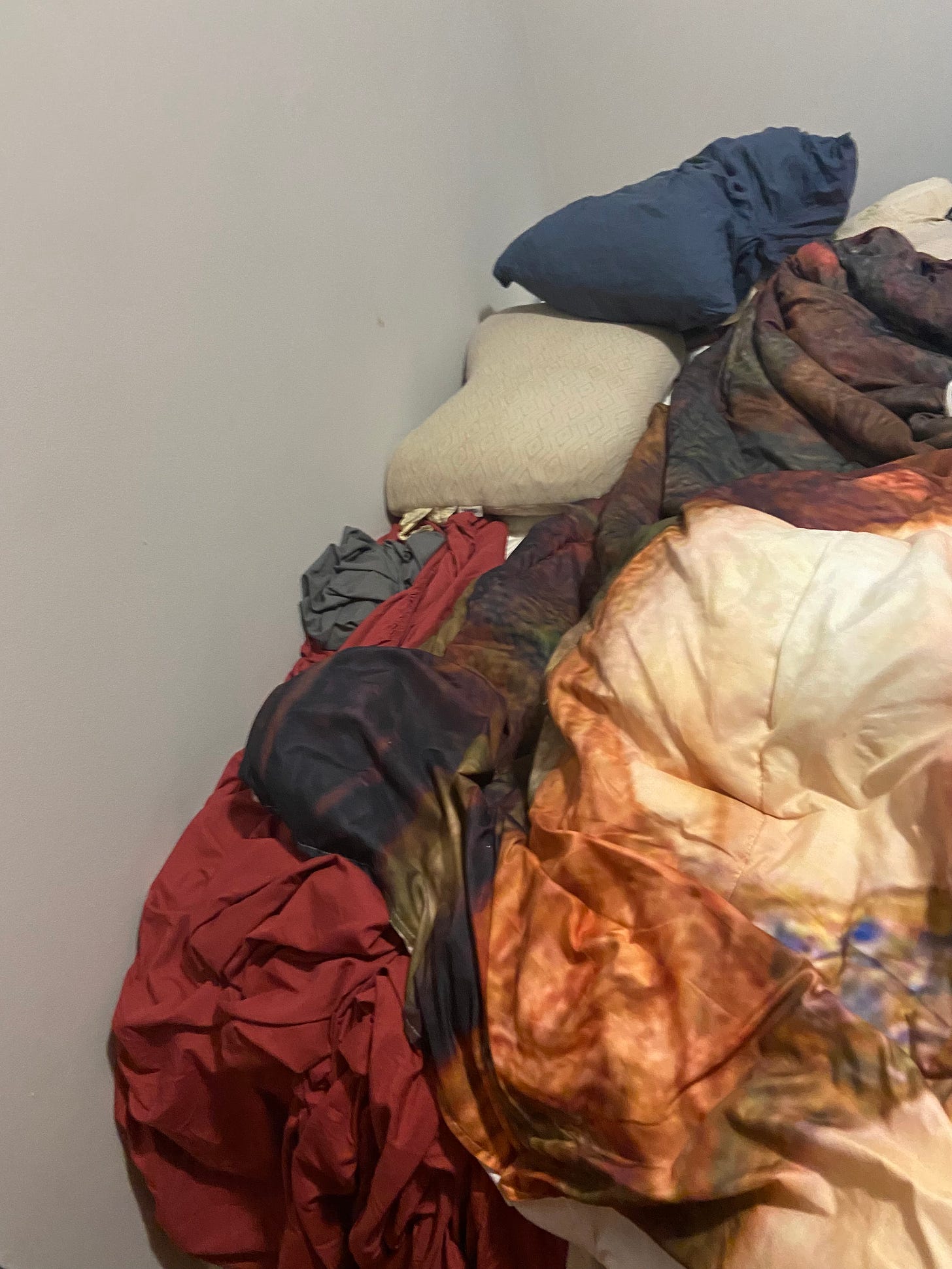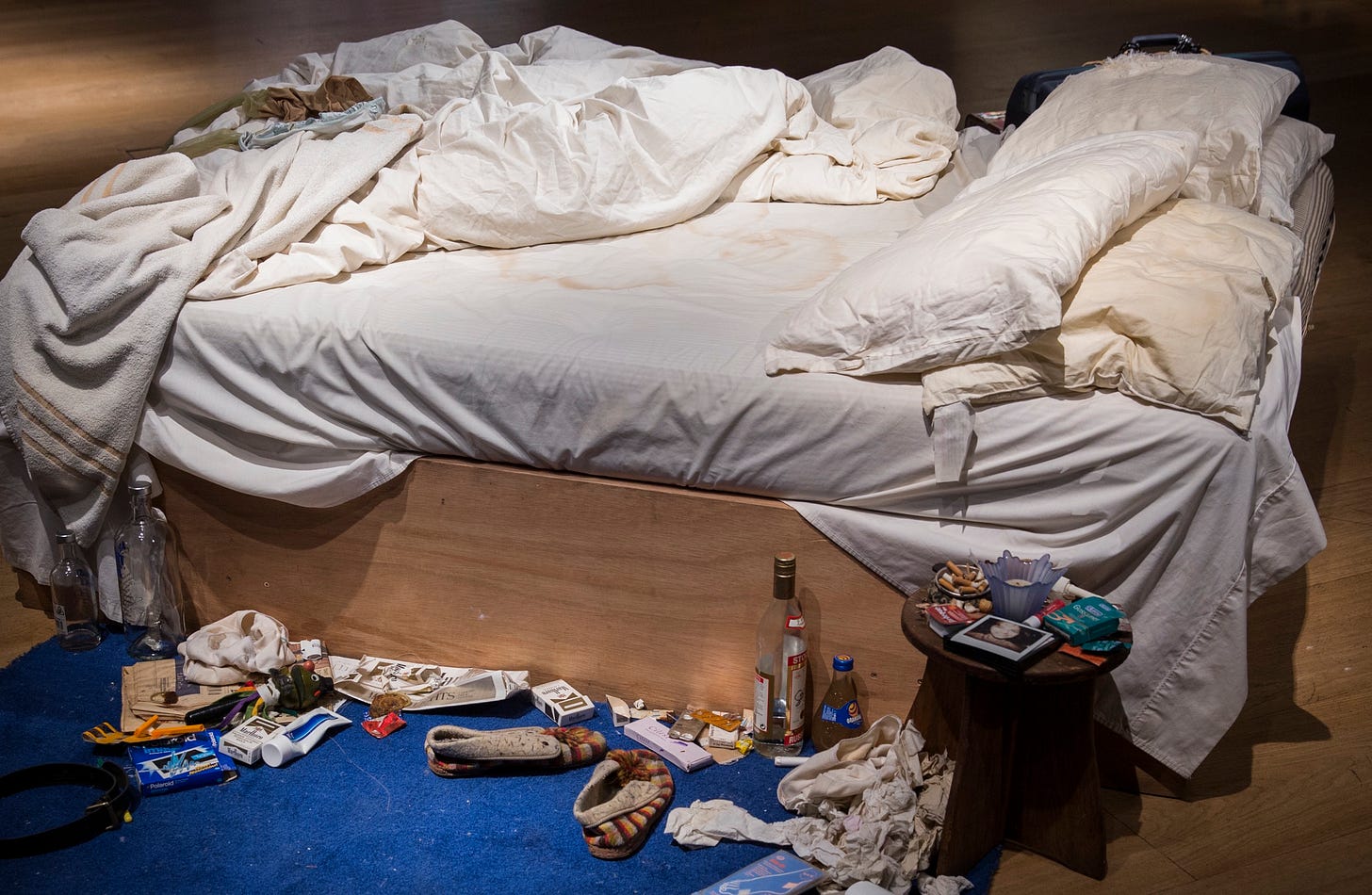A Covid Diary
"It felt like I'd spent two years outrunning a wolf, only to fall limply into its dark jaws at the last."
I tested positive for covid on my mother's birthday, and that night I couldn't sleep at all.
I could see the faint blue line of the positive result glowing against my eyelids whenever I tried to shut them. For two years I'd been avoiding this moment, which, soberly considered, represented two lucky years of benefitting from the world's scientific and medical establishments learning about this novel and catastrophic disease, and enough time for the vaccine sequence I'd gladly taken into my left arm three times to be developed and administered. In febrile intoxication, in the dark watches of the night, it felt like I'd spent two years outrunning a wolf, only to fall limply into its dark jaws at the last.
I excel at being afraid, but am rarely confronted with true causes for fear. My head was full of river silt, lips cracking, skin dewed with sweat, every orifice stuffed with scabrous gunk. A violent headache throbbed against my temples; with each pulse surged horror stories about this illness—slow suffocation, stroke, neurological damage, delirium, hearts and lungs and kidneys shredded in cytokine hurricanes. I considered every way I could die or become physically disabled from within the hot cloud of my fever, lying prone on my stomach in a mess of blankets and jerking up in terror every few minutes. Nothing made sense except the seeming confluence of disease and death, a marriage made inevitable by years of building dread. I had moved only a week earlier and had no thermometer or pulse oximeter, no way to measure the reality of what was happening to me, so I assumed catastrophe.
As the night inched on, I rose and feebly paced. Spots swam in front of my eyes; I sank down on the January-cold wrought-iron stairs leading to the cement patch called my backyard, and I heard the trains groan by at their regular intervals, and felt, deliriously, as if the rumble were in my bones, that the iron of my blood had laid down tracks for them. The chill wind touched my clammy head but didn't cool it. I called friends in California and then Australia and then, at last, in the predawn darkness, a kind friend called and breathed with me until finally I realized I could breathe. Until then I hadn't believed it. At six-thirty AM I called a lover and made him stay on the phone while I guzzled water into a fever-parched throat: I was afraid I would drown if no one was there, drown in a mug of water.
In my rational mind, I know I am loved and, still better, that many of my loved ones live very close. But under my sternum, where fear lives, the thought of a lonesome and disregarded death, my deepest phobia since an unfortunate incident at the age of 22, had stolen a march on me again. Imagining my own putrescing bluish corpse, I drank more water and threw it up. The self-pity engendered in me by illness is repellent, and I know it. Status: floppy as old aspic, sweating like a cheese in the sun.
Finally and somehow I eased my fear-curled body to the bed and slept: from 10am to 7pm. I woke up sweating and found my family had been trying to get in touch all day. ARE YOU OKAY? asked my mother in all caps, twice. I reassured them, lay down again, and slept for twelve hours more. No dreams.
I woke again and found I couldn't think in a straight line. Muzzy fear and a scanty sentence at a time was all I could achieve with the brain I had prized above all things for most of my frivolous life. What's more, having too long used my nose as a crutch to aid the process of breathing, and now finding it plugged with lead-solid bogeys, my usually capable mouth gulped desperately for air. But a friend had dropped off a pulse oximeter while I was sleeping, and the numbers cut through my web of doomed fantasy: oxygen 98. Heart rate sky-high, humming into the 130s, a combination of hard labor and terror. Still, even if I felt like I couldn't breathe, the numbers on the machine told me I could, and so my breathing eased a little.
I felt violently angry at the government; I had spent so much on tests; they seemed to have given up entirely, allowing uncontrolled spread with palpable relief, and not a dollar to the dole, and no hospital space, and the mail a mess, and Riker's Island… soon enough I felt breathless again. I texted my mother and told her I was afraid.
YOU ARE GOING TO BE FINE, she wrote, the capital letters seeming to me half chiding and half command. I wanted fervently to obey. I wanted it to be a spell warding me against consequences.
At least the heroine of the Charlotte Perkins Gilman novel had yellow wallpaper around her. No time to decorate before falling ill: I was going mad in a shade I'd dubbed “unwashed asshole grey.” I knew I wasn't thinking clearly but could not think my way to clarity. I felt violently trapped, cramped in my own bad mind and a room with a view of concrete out the window. Isolation was necessary but I missed my friends, lovers and family so much it ached as much as the rest of me. My father came by to drop off a second pulse oximeter; we kept our masks on, didn’t touch, remained together for five minutes total. I throbbed like a swollen elbow and felt approximately as useful.
The Sword and the Sandwich is a newsletter about serious extremism and equally serious sandwiches. Please consider supporting this work with a paid subscription:
Night: more terror; the shallowness of my breathing, the frantic pace of my heartbeat, seemed to rise with the waning of the light like a grim moon. The illness made me lose object permanence: knowing there was no one I could speak to made me convinced I could no longer speak. What a way to discover that the swooning death-wish I'd held close since the age of fourteen was all phony. No one could be as afraid of dying as this and not want to live. Had I had the energy to find my copy among the unpacked boxes, I would have tossed “The Sorrows of Young Werther” out the window; but I didn't have any energy, and besides, I was no longer young, and there were bars on my window. I had nothing but time to think, and spent it scouring my self-worth with steel wool. Census of my life: 32, one book, one failed marriage, no children; no house, no car, but satisfactory oxygen levels. Selfish, publicly messy, spouseless and futureless but with too much past, sinuses pincering hotly into the bridge of my nose. “Lonely, lonely, I was born to be lonely,” as William Carlos Williams said—but he adds—“I am best so,” and there we diverge.
My sister visited: we stood outside in our duckbill N95s and she walked me around the block. My heart rate rose in approximate pace with the cold concrete topography. I told her I was afraid I was going to die, if not now then in six months, and even though I used the impressive word “sequelae,” she laughed, a mask-muffled, welcome laugh. I remembered my mother's incantation: YOU ARE GOING TO BE FINE. I would try, as I have all my life, to do her bidding.
I don't remember the third day at all except that I assembled a lamp , took and posted a picture of the lamp, then had to lie down, exhausted beyond measure. No dreams.
Another sleepless and existentially terrifying night, til dawn on the fourth day. Only in writing this have I regained some of my verbal dexterity. The intensity of the ragged-breathed terror of 1- and 2- and 3- and 4- and 5am are banal to repeat and hideous to experience; I would claw myself scarred to avoid a repetition, I would like to call the college kid at the controls and tell them to stop the ride, or at least get off a good, piercing, cathartic scream. But I've lost most of my voice. By CDC recommendation I am permitted to leave my apartment in a few more days. I want to be held so badly my skin is on fire for it. I touch the spot where a cool and gentle kiss would settle on my forehead and find it: clammy, sagged, sour with bed and fear. I do not know how many more nights like this I can stand, nor do I know how many are in store; the contest seems exciting.
I sleep again come morning, sleeping solid as old wood, and leaving me nearly as stiff. My head hurts and my chest is heavy but I feel somehow, indefinably, a little better. I can still sense the miasma of ailment gathered around me but there is a little more surety to my step and I don’t vomit. By now I experience nightfall as a personal affront, like being forced at gunpoint into a puma’s stalking grounds. Hiss of the humidifier, rattle of breath, me jerking like a marionette at the surges of panic, up, then down again. The water from the bathroom tap is blessedly cold, freezing, and I sip and sip from my black cup, sliding to the cold floor, my limbs barely able to hold the thing to my lips. As I often do I imagine myself watching my body critically, knotted and fat on the faux-marble tile, hair damp, eyes glazed with illness. I want to be as cold and impermanent as this water; I long to sleep soundly in a copper pipe until called, then vanish down a warm throat, into warm blood: to be necessary. But I return to my lumpen self, stand with an effort, place the cup on the counter with undue solemnity, steady it, steady myself, turn back to bed to fear and heal some more.
To calm the heart: breathe in for four counts, hold one, then out for six, until your fingers stop tingling hypoxically. Peek inside the dark recesses of Pandora's box—gaudy wrought brass, toothily hinged, altogether of questionable taste—and sweep your hand around, feeling for the tiny luminescent creature she left trapped: hope. Hook it with your middle finger as it tries to escape you—that's the one that shows the highest numbers on the pulse oximeter. Press its frail body to your large and fetid chest, until sunrise.








Jesus, I’m sorry for your illness, but it can’t be legal to write this brilliantly, sick or otherwise. Whew, amazing. ❤️
Thanks for making the effort to write this. If you'd brought us any closer to the edge of the yawning pit, I'd be short of breath myself.